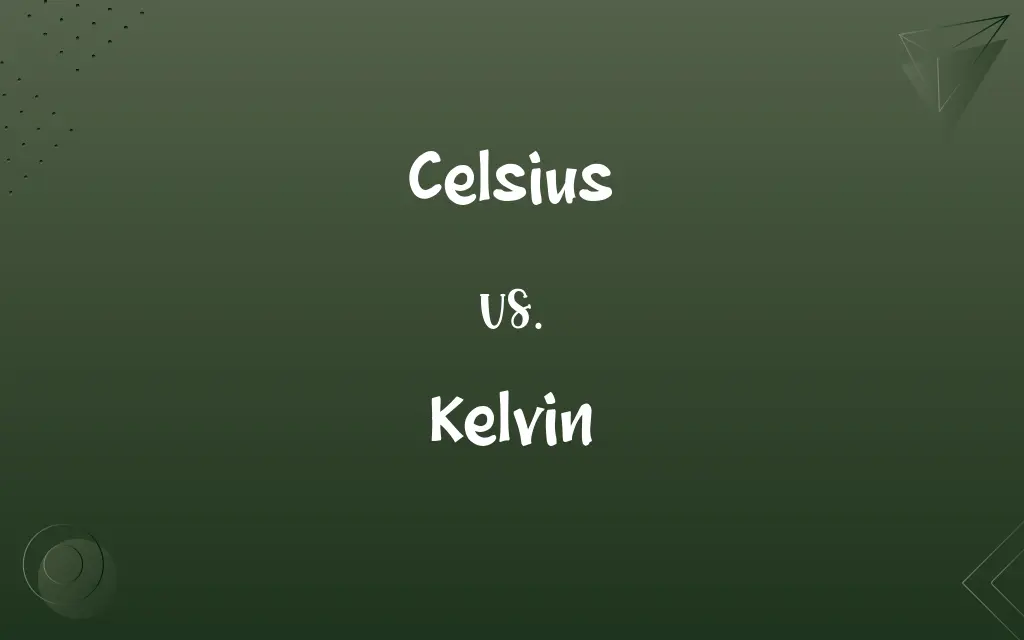Celsius vs. Kelvin: Know the Difference

By Shumaila Saeed || Published on January 1, 2024
Celsius is a temperature scale with 0°C as water's freezing point and 100°C its boiling point, while Kelvin is an absolute scale starting at absolute zero (0 K).

Key Differences
Celsius, denoted as '°C', is a temperature scale commonly used in daily life and scientific contexts. It is based on the properties of water, with 0°C representing the freezing point and 100°C the boiling point under standard atmospheric conditions. Kelvin, on the other hand, is an absolute temperature scale, symbolized as 'K'. It is primarily used in scientific research and defines absolute zero, where molecular motion stops, as 0 K.
Shumaila Saeed
Jan 01, 2024
The Celsius scale is part of the metric system and is widely used for everyday temperature measurements in most of the world. It was named after the astronomer Anders Celsius. Kelvin, named after the physicist Lord Kelvin, is one of the seven base units in the International System of Units (SI) and is pivotal in thermodynamics and physics.
Shumaila Saeed
Jan 01, 2024
When converting temperatures, the Celsius scale requires adding or subtracting values to shift to other scales like Fahrenheit. Kelvin, in contrast, is directly related to the Celsius scale, with a simple conversion: K=°C+273.15. This reflects the absolute nature of the Kelvin scale, where each unit increment equals one degree Celsius.
Shumaila Saeed
Jan 01, 2024
In terms of usage, Celsius is more commonly encountered in weather forecasts, cooking, and general temperature references. Kelvin is used in scientific calculations involving physical constants, such as the Boltzmann constant, and in studies where absolute zero plays a role, like low-temperature physics.
Shumaila Saeed
Jan 01, 2024
Technically, the term 'degrees' is not used with Kelvin. It's simply 'kelvins'. In Celsius, temperatures are expressed in 'degrees Celsius'. This linguistic distinction underscores Kelvin's status as an absolute measure of thermal energy, while Celsius is a relative measure based on a specific physical condition (water's phase change points).
Shumaila Saeed
Jan 01, 2024
ADVERTISEMENT
Comparison Chart
Unit Name Origin
Named after Anders Celsius, a Swedish astronomer.
Named after Lord Kelvin, a British physicist.
Shumaila Saeed
Jan 01, 2024
Scale Type
Relative scale based on water's freezing and boiling points.
Absolute temperature scale starting at absolute zero.
Shumaila Saeed
Jan 01, 2024
Usage Context
Common in daily life, weather reporting, and non-scientific contexts.
Used in scientific research, especially in physics and thermodynamics.
Shumaila Saeed
Jan 01, 2024
Conversion to Kelvin
K=°C+273.15
Kelvin is the base unit; no conversion necessary for its own scale.
Shumaila Saeed
Jan 01, 2024
ADVERTISEMENT
Celsius and Kelvin Definitions
Celsius
Celsius is a metric temperature scale with water's freezing point at 0°C.
The room temperature was a comfortable 20°C.
Shumaila Saeed
Dec 20, 2023
Kelvin
Kelvin, symbolized as 'K', is one of the SI base units.
The Boltzmann constant is expressed in joules per Kelvin.
Shumaila Saeed
Dec 20, 2023
Celsius
Celsius is often used in everyday contexts like cooking and ambient temperature measurement.
The recipe called for the oven to be preheated to 180°C.
Shumaila Saeed
Dec 20, 2023
Kelvin
Kelvin is an absolute temperature scale used in scientific research.
At 0 Kelvin, also known as absolute zero, all molecular motion stops.
Shumaila Saeed
Dec 20, 2023
Celsius
Celsius, denoted as '°C', is widely used in international weather forecasting.
The forecast predicted a high of 28°C for the day.
Shumaila Saeed
Dec 20, 2023
ADVERTISEMENT
Kelvin
Kelvin unit is used without the word 'degree'.
Water boils at about 373 Kelvin under standard conditions.
Shumaila Saeed
Dec 20, 2023
Celsius
Celsius scale is pivotal in scientific studies involving temperature, except for absolute thermodynamic calculations.
In her experiment, she heated the solution to 75°C.
Shumaila Saeed
Dec 20, 2023
Kelvin
Kelvin scale begins at absolute zero, unlike Celsius or Fahrenheit.
The temperature of outer space is about 2.7 Kelvin.
Shumaila Saeed
Dec 20, 2023
Celsius
Celsius is a relative temperature scale, easily convertible to Fahrenheit.
To convert 30°C to Fahrenheit, double it and add 30, making it approximately 90°F.
Shumaila Saeed
Dec 20, 2023
Kelvin
Kelvin is crucial in studies involving extreme temperatures, like those in astrophysics and cryogenics.
Scientists achieved a temperature close to 1 millikelvin in their lab.
Shumaila Saeed
Dec 20, 2023
Celsius
Of or relating to a temperature scale that registers the freezing point of water as 0° and the boiling point as 100° under normal atmospheric pressure. See Table at measurement.
Shumaila Saeed
Dec 13, 2023
Kelvin
A unit of absolute temperature equal to 1/273.16 of the absolute temperature of the triple point of water. One kelvin degree is equal to one Celsius degree. See Table at measurement.
Shumaila Saeed
Dec 13, 2023
Kelvin
Kelvin A temperature scale in which zero occurs at absolute zero and each degree equals one kelvin. Water freezes at 273.15 K and boils at 373.15 K.
Shumaila Saeed
Dec 13, 2023
Celsius
The Celsius thermometer or scale, so called from Anders Celsius, a Swedish astronomer, who invented it. It is the same as the centigrade thermometer or scale.
Shumaila Saeed
Dec 13, 2023
Kelvin
In the International System of Units, the base unit of thermodynamic temperature; 273.16 of the thermodynamic temperature of the triple point of water. Shown as "K".
Shumaila Saeed
Dec 13, 2023
Celsius
Swedish astronomer who devised the centigrade thermometer (1701-1744)
Shumaila Saeed
Dec 13, 2023
Kelvin
A unit interval on the Kelvin scale.
The interval between the freezing and boiling points of water is 100 kelvins.
Shumaila Saeed
Dec 13, 2023
Kelvin
(usually as postpositioned adjective) A unit for a specific temperature on the Kelvin scale.
Ice melts above 273.15 kelvins.
Water boils above 373.15 kelvins.
Shumaila Saeed
Dec 13, 2023
Kelvin
The SI unit of temperature, defined as being 1/273.16 of the triple point of water; abbreviated K. The melting point of water at 760 mm pressure is 273.15 Kelvins, and the boiling point 373.15 Kelvins. One degree Kelvin is equal to one degree Centigrade, and
Shumaila Saeed
Dec 13, 2023
Kelvin
The basic unit of thermodynamic temperature adopted under the Systeme International d'Unites
Shumaila Saeed
Dec 13, 2023
Kelvin
British physicist who invented the Kelvin scale of temperature and pioneered undersea telegraphy (1824-1907)
Shumaila Saeed
Dec 13, 2023
Repeatedly Asked Queries
What is Celsius?
Celsius is a temperature scale where 0°C is water's freezing point and 100°C is its boiling point.
Shumaila Saeed
Jan 01, 2024
Is Celsius used worldwide?
Celsius is widely used worldwide, except in the United States, where Fahrenheit is more common.
Shumaila Saeed
Jan 01, 2024
Who invented the Celsius scale?
The Celsius scale was developed by Anders Celsius, a Swedish astronomer.
Shumaila Saeed
Jan 01, 2024
What is Kelvin?
Kelvin is an absolute temperature scale used in science, starting at absolute zero.
Shumaila Saeed
Jan 01, 2024
Who named the Kelvin scale?
The Kelvin scale is named after Lord Kelvin, a British physicist.
Shumaila Saeed
Jan 01, 2024
Can Celsius be negative?
Yes, Celsius can be negative, typically in extremely cold temperatures.
Shumaila Saeed
Jan 01, 2024
Does Kelvin have negative values?
No, Kelvin does not have negative values as it starts from absolute zero.
Shumaila Saeed
Jan 01, 2024
Is Celsius part of the metric system?
Yes, Celsius is a part of the metric system.
Shumaila Saeed
Jan 01, 2024
Why don't we use degrees with Kelvin?
Kelvin is an absolute scale, so the term 'degrees' is not used, to distinguish it from relative scales like Celsius.
Shumaila Saeed
Jan 01, 2024
How do you convert Celsius to Fahrenheit?
Convert Celsius to Fahrenheit by multiplying by 1.8 (or 9/5) and adding 32.
Shumaila Saeed
Jan 01, 2024
What is the significance of 0°C?
0°C is significant as it's the freezing point of water under standard conditions.
Shumaila Saeed
Jan 01, 2024
Why is Kelvin important in science?
Kelvin is important for scientific accuracy, especially in thermodynamics and physics.
Shumaila Saeed
Jan 01, 2024
Why is Celsius popular in daily use?
Celsius is popular in daily use due to its relevance to everyday temperature experiences.
Shumaila Saeed
Jan 01, 2024
What's the boiling point of water in Kelvin?
The boiling point of water in Kelvin is approximately 373 K.
Shumaila Saeed
Jan 01, 2024
Can Celsius and Kelvin be equal?
Celsius and Kelvin values can never be equal because of their different starting points.
Shumaila Saeed
Jan 01, 2024
How do daily temperatures relate to Kelvin?
Daily temperatures are rarely expressed in Kelvin, as it is a scale more suited for scientific measurements.
Shumaila Saeed
Jan 01, 2024
Is Kelvin used in weather reporting?
No, Kelvin is not typically used in weather reporting; Celsius or Fahrenheit are used instead.
Shumaila Saeed
Jan 01, 2024
Why is Kelvin zero called absolute zero?
Kelvin zero is called absolute zero because it's theoretically the lowest possible temperature, where molecular motion ceases.
Shumaila Saeed
Jan 01, 2024
Is Kelvin only for scientific use?
Primarily, Kelvin is used in scientific contexts, though it has some industrial applications.
Shumaila Saeed
Jan 01, 2024
Share this page
Link for your blog / website
HTML
Link to share via messenger
About Author
Written by
Shumaila SaeedShumaila Saeed, an expert content creator with 6 years of experience, specializes in distilling complex topics into easily digestible comparisons, shining a light on the nuances that both inform and educate readers with clarity and accuracy.









































































